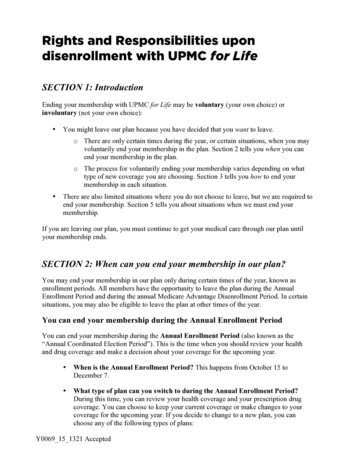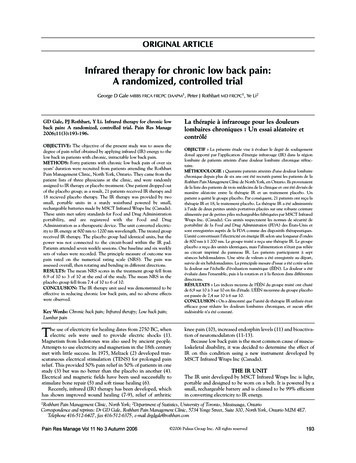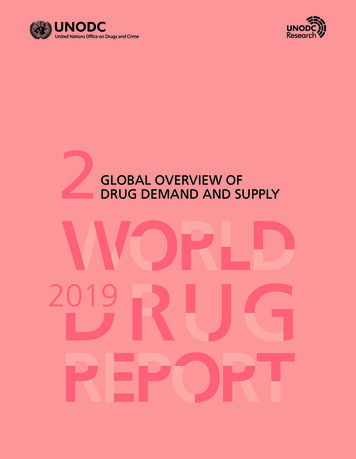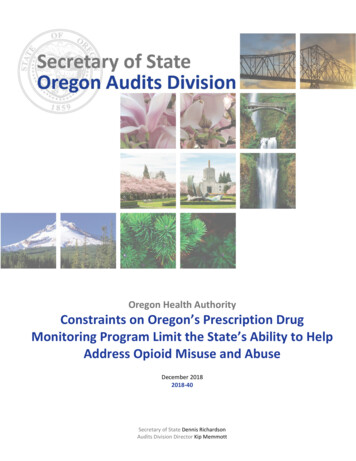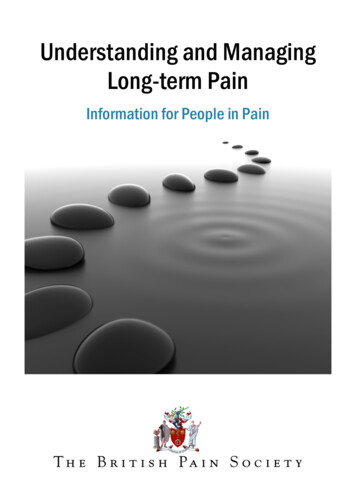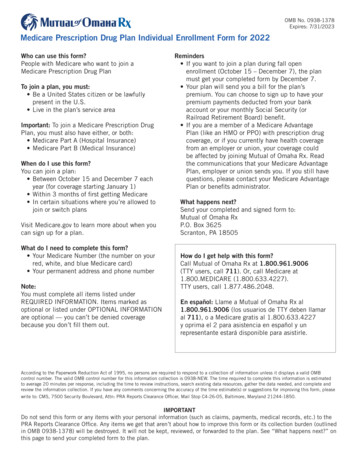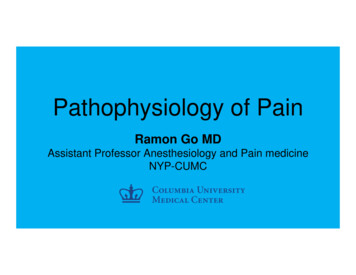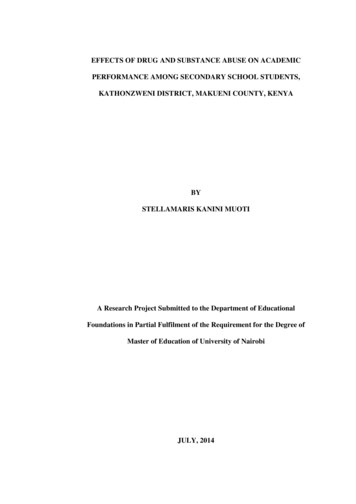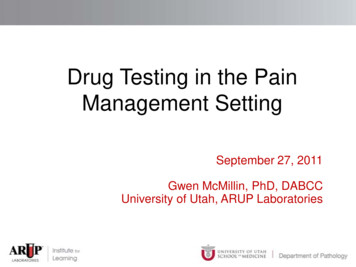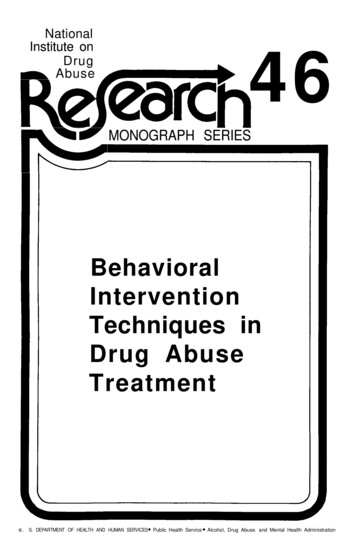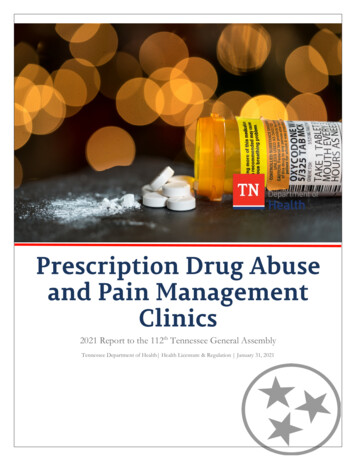
Transcription
Prescription Drug Abuseand Pain ManagementClinics2021 Report to the 112th Tennessee General AssemblyTennessee Department of Health Health Licensure & Regulation January 31, 2021
ContentsIntroduction .1Pain Management Clinic Licensure .2High Risk Controlled Substance Providers .5Conclusion .6
IntroductionIn recent years, the number of deaths in Tennessee caused by drug overdose has been higher than thenumber of deaths caused by motor vehicle accidents. In fact, in 2019, 2,089 people died of a drugoverdose in Tennessee, compared to 1,818 in 2018. According to the Centers for Disease Control andPrevention’s National Center for Health Statistics the average life expectancy in the U.S. has been ondecline for three consecutive years; one of the factors that contributes to this decline is a rise in drugoverdoses.In 2012, the legislature enacted the Prescription Safety Act. One requirement of the Act is that, effectiveApril 1, 2013, practitioners who prescribe certain controlled substances must query the ControlledSubstance Monitoring Database (CSMD) prior to issuing a new prescription to a patient and at leastannually thereafter. Tenn. Code Ann. § 53-10-310(e)(1). The purpose of the requirement is to allowpractitioners to identify patients who may have a substance abuse problem and/or who may be doctorshopping (i.e., going to different doctors for treatment and obtaining prescriptions from each one).Since the passage of the Prescription Safety Act of 2012, utilization of the database has significantlyincreased, and the prescription of opioids and benzodiazepines has decreased over that same time period.In 2016, an updated Prescription Safety Act passed which, among other changes, added a requirementfor the dispensers check the database the first time a patient was dispensed a substance at that practicesite and again annually. This assists pharmacists in their treatment of patients through acting as a checkin the event a prescriber is unaware of a problem.In July 2018, the General Assembly enacted Public Chapter 1039 which placed reasonable limits on theamount and duration of opioids used for acute pain. It limits opioid prescriptions to up to a three-daysupply with a total of 180 MME (morphine milligram equivalents). Clinical judgement and the patientprescriber relationship was preserved by providing several exceptions under certain circumstances.Some of the exemptions include patients seeing a pain management specialist, patients receiving activecancer treatment, patients who are undergoing a palliative care treatment, patients receiving hospicecare, patients with a diagnosis of sickle cell disease, and patients receiving opioids in a licensed facility.In 2019, the legislature made a variety of small changes and additions to the TN Together opioidinitiative. Among the changes were the inclusion of definitions for the terms palliative care, severe burn, andmajor physical trauma. Palliative care was added as an exception to the opioid dosage limits otherwiserequired under TN Together. The new legislation also made partial filling of opioids permissive. Finally, theopioid limits from the original act were simplified. Instances such as more than minimally invasive surgery,which previously fell under a twenty-day provision, were changed to be treated under the limits of the thirtyday category.Page 1
Pain Management Clinic LicensurePrior to the Prescription Safety Act of 2012, the General Assembly passed legislation in 2011regulating pain clinics and requiring that all pain management clinics register with the state.Tenn. Code Ann. § 63-1-301 et seq. This legislation created a certification process for painmanagement clinics and required that each clinic’s owner register with the state to receive acertificate. Each clinic was required to have a medical director who met certain educational andtraining requirements. Effective July 1, 2016, medical directors of pain management clinicswere required by Public Chapter 475 of the 109th General Assembly to meet the definition of apain management specialist. In addition, all advanced practice registered nurses and physicianassistants working in pain clinics must be supervised by pain management specialists.Beginning July 1, 2017, all pain management clinics were required to become licensed Tenn.Code Ann. 63-1-301. All active pain management clinics have been issued a license; there arenot any active pain management clinics operating on a certificate. The licensure requirements aremore stringent than those of registration for a certificate, and new rules have been promulgatedby the Department to govern the process of regulating the licensed clinics.The Pain Management Clinic Act requires the medical director of a pain management clinic to beon-site at the clinic at least 20% of the clinic’s weekly operating hours and prohibits the medicaldirector from serving in that capacity at more than four (4) pain clinics. It also requires themedical director be the license holder. Previously, medical directors were not required to be theowner/certificate-holder and many certified clinics were owned by an advanced practiceregistered nurse or a physician assistant. Requiring the medical director to be the individual whoapplies for and is responsible for the license, gives medical directors both more power andcontrol over what happens under their watch at a clinic, as well as more responsibility.Additionally, the law requires the Department to inspect every pain management clinic beforelicensure. The Department may deny licensure, or discipline an existing license, if anyoneworking in the clinic has been convicted for an offense involving the sale, diversion, ordispensing of controlled substances, has been disciplined for conduct that was the result ofinappropriate prescribing, dispensing, or administering controlled substances, or has had theirlicense restricted, or if an owner of the clinic has pleaded to or been convicted of a felony.T.C.A. § 63-1-316.Furthermore, though licensure inspections are now required, random clinic inspections had notbeen required by law prior to July 1, 2017; however, random inspections have been undertakenby the Department as a best practice. Prior to July 1, 2017, the Department randomly inspectedone third of certified pain clinics each year. After July 2017, when the law was amended torequire clinics to be licensed, and through the calendar year 2019, unannounced inspections haveoccurred pursuant to a licensure application instead of as previously conducted.Page 2
During the 2020 calendar year: Thirty-five (35) licensure inspections were conducted. Due to the pandemic, inspectionswere suspended resulting in the decrease from sixty-two (62) in 2019 to thirty-five (35) in2020.Twenty-eight (28) biennial licensure inspections were conducted.Zero (0) applications for licensure were denied.Three (3) pain clinics were granted conditional licenses.Zero (0) clinic license was revoked or surrendered.Pain Clinic License RenewalPain management clinic licenses are active for two (2) years. The fall of 2019 was the beginningof the renewal cycle for licensed pain management clinics. There was a total of sixty-six (66)pain clinic licenses set to expire in 2020; nineteen (19) of those clinics have closed and are nolonger operating, forty-two (42) have been renewed and five (5) renewal applications remain in apending status and are awaiting deficient documentation for the application to be reviewed.Tennessee Pain Management Clinic Rules and GuidelinesIn order to promulgate rules governing the new licensure process, the Department formed a taskforce of members of the Board of Medical Examiners, the Board of Osteopathic Examination, thePhysician Assistant Committee, and the Board of Nursing. In December of 2016, the task forcemet to review a proposed draft of the rules and heard and responded to public comment. Afterincorporating much of the feedback from the task force and the public, the Departmentpromulgated emergency rules in May of 2017, and held a rulemaking hearing in July of 2017 tohear public comment on those rules becoming permanent. After a lengthy public hearing andpassage of a period for written comment, the updated, permanent rules became effective inNovember of 2017.Page 3
The pain clinic rules, the FAQ information, and pain clinic guidelines posted to the Department’sPain Management Clinic website give practitioners information they need to understand andcomply with the new licensure process.The Pain Clinic Guidelines: fboards/painmanagement-clinic/Pain Clinic Guidelines.pdfFAQ Information: fboards/painmanagement-clinic/Pain Clinic FAQ.pdfPractice Guidelines for Treatment of Chronic PainIn response to the legislation passed by the General Assembly, in 2012 the Department created theposition of medical director of special projects, whose duties include facilitating the creation andreview of guidelines for prescribing opioids, benzodiazepines, barbiturates, and carisoprodol asrequired by T.C.A. § 63-1-401 et seq. The medical director of special projects has traveledthroughout the state discussing pain management with practitioners and getting feedback forconsideration in developing courses for the upcoming year Opioid symposia.In 2013 and as part of the Addison Sharp Prescription Regulatory Act, Tenn. Code Ann. 63-1-401et seq., the General Assembly directed the Department to create treatment guidelines forprescribing of opioids, benzodiazepines and other drugs to be used by Tennessee practitioners incaring for patients. The Chronic Pain Guidelines were developed to provide guidance in treatingchronic pain by practitioners who are not pain specialist or do not practice within a painmanagement clinic. The method used to formulate these guidelines included a review of nationalexpert panel recommendations and state practice guidelines, multiple listening sessions withclinicians in Tennessee, oversight by a chronic pain guidelines committee and recommendationsfrom an advisory committee with strong representation by clinicians with specialty training in avariety of fields including pain medicine. The guidelines have been updated each year withadditional input from the chronic pain guidelines committee and have been adopted by the variousprescribing health related boards.The 3rd edition of the Chronic Pain Guidelines was completed by the Chronic Pain GuidelinesExpert Panel in 2018 and posted in January 2019. The guidelines and those who gave of theirtime and expertise to make the guidelines a reality can be found ines.pdfPage 4
High Risk Controlled Substance PrescribersTenn. Code Ann. §68-1-128 requires the Department to identify and notify high-risk prescribersbased on clinical outcomes, including patient overdoses. In July of 2020, letters were sent to thetop ten (10) providers identified by the Department as high-risk based on prescribing datacontained in the Controlled Substance Monitoring Database (CSMD) to inform them to take thefollowing remedial actions: Required to complete continuing education designed about the risks, complications, andconsequences of opioid addiction.Make educational material available in waiting room and clinic areas accessible topatients that warn patients of the risks, complications, and consequences of opioidaddiction.Obtain written consent from every patient who will receive opioid therapy for more thanthree (3) weeks with daily dosages of sixty (60) morphine milligram equivalents (MME)or higher that explains the risks of, complications of, medical and physical alternatives to,and consequences of opioid therapy and addiction. The high-risk prescribers are requiredto comply with these requirements for a period of one (1) year.Top 50 PrescribersAs required by Tenn. Code Ann. § 68-1-128, the Department must also identify and notify thetop fifty (50) prescribers of controlled substances in the state. The medical director’s team, alongwith the Office of General Counsel, reviews the data on the top 50 prescribing practitioners inTennessee and uses that data to assist in identifying practitioners of concern as well as educatingpractitioners. The total morphine equivalence prescribed in aggregate by the Top 50 prescribershas decreased each year since 2013. The MMEs prescribed by this group have declined 57%since the first analysis perform on data from 04/01/2012 – 03/31/2013 as noted in the line graphbelow.Page 5
Despite the increasing death rate, analysis of the Controlled Substance Monitoring Databaseshows that progress has been made in many areas. The number of opioid prescriptions hasdeclined by 43% between 2012 and 2019. From 2013 through 2015, opioid prescriptionsnumbered around 2 million per quarter (representing a crude rate of about 300 – 325prescriptionsper 1000 residents).After Q4 2019, opioid prescriptions for pain have declined in each quarter, down to just over 1.3million (189 per 1,000). In 2019, about 73% of patients who filled prescriptions of opioids forpain had active prescriptions for only a month or less during the entire year. In 2020, as in manyprevious years, the top three most prescribed controlled substances in Tennessee werehydrocodone products (e.g., Lortab, Lorcet, Vicodin, gabapentin, and oxycodone products (e.g.,OxyContin, Roxicodone). Prescription Drug Overdose Program: 2019 Report.There has been an 92% decrease in doctor/pharmacy shopping (defined for these purposes asvisiting five or more prescribers or dispensers in a three-month period) from 2013 through 2018.The amount of MME’s (morphine milligram equivalents) dispensed per capita from 2012 to2020 decreased for every county across the state, with an approximate 57% decrease statewide inopioid MME’s dispensed from 2012 to 2019.ConclusionThe Department is working diligently to protect the people of Tennessee from the effects ofprescription drug abuse. Our goal for the citizens of the State of Tennessee is to provide access toquality pain management. In collaboration with health care experts, dispensers and prescribers, weattempted to provide stricter regulations for practitioners to reduce the number of patients beingadversely affected by inappropriate prescribing and dispensing.Pain Management Clinic Licensure665 Mainstream Drive, 2nd FloorNashville, Tennessee 37243Page 6
Pain Clinic License Renewal Pain management clinic licenses are active for two (2) years. The fall of 2019 was the beginning of the renewal cycle for licensed pain management clinics. There was a total of sixty-six (66) pain clinic licenses set to expire in 2020; nineteen (19) of those clinics have closed and are no
